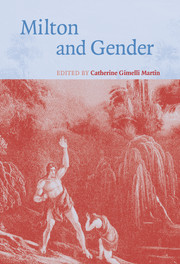Book contents
- Frontmatter
- Contents
- List of illustrations
- Notes on contributors
- Acknowledgments
- Abbreviations
- Introduction: Milton's gendered subjects
- PART I MASCULINITY, DIVORCE, AND MISOGYNY IN MILTON'S PROSE
- PART II THE GENDERED SUBJECTS OF MILTON'S MAJOR POEMS
- 4 The profession of virginity in A Maske Presented at Ludlow Castle
- 5 The genders of God and the redemption of the flesh in Paradise Lost
- 6 Transported touch: the fruit of marriage in Paradise Lost
- 7 The experience of defeat: Milton and some female contemporaries
- 8 Samson and surrogacy
- 9 “I was his nursling once”: nation, lactation, and the Hebraic in Samson Agonistes
- 10 “The Jewish Question” and “The Woman Question” in Samson Agonistes: gender, religion, and nation
- PART III GENDERED SUBJECTIVITY IN MILTON'S LITERARY HISTORY
- Index
9 - “I was his nursling once”: nation, lactation, and the Hebraic in Samson Agonistes
Published online by Cambridge University Press: 22 September 2009
- Frontmatter
- Contents
- List of illustrations
- Notes on contributors
- Acknowledgments
- Abbreviations
- Introduction: Milton's gendered subjects
- PART I MASCULINITY, DIVORCE, AND MISOGYNY IN MILTON'S PROSE
- PART II THE GENDERED SUBJECTS OF MILTON'S MAJOR POEMS
- 4 The profession of virginity in A Maske Presented at Ludlow Castle
- 5 The genders of God and the redemption of the flesh in Paradise Lost
- 6 Transported touch: the fruit of marriage in Paradise Lost
- 7 The experience of defeat: Milton and some female contemporaries
- 8 Samson and surrogacy
- 9 “I was his nursling once”: nation, lactation, and the Hebraic in Samson Agonistes
- 10 “The Jewish Question” and “The Woman Question” in Samson Agonistes: gender, religion, and nation
- PART III GENDERED SUBJECTIVITY IN MILTON'S LITERARY HISTORY
- Index
Summary
At the culmination of his long lament on the “miserable change” inflicted upon him, Samson despairs that “I was his nursling once” (SA 634). This chapter takes Samson's painful recollection of his chosen status as God's “nursling” as a point of departure for an investigation of the play's – and its hero's – preoccupations with “purity.” To be sure, such preoccupations have been well documented; but surprisingly little attention has been paid to the intimate connections between the question of “purity” in Samson Agonistes and Samson's self-definition as God's “nursling.” This omission becomes particularly meaningful when we consider the close intersections between Samson's “nursling” identity and his Nazarite election, an election defined by the deity's prohibition against “wine and all delicious drink” (541). For Samson to remain a Nazarite, and, hence, “separate to God,” he must assert his purity by drinking only providentially sanctioned fluids, specifically, the “clear milky juice” (551) that anoints him as God's “nursling” and Israel's “great Deliverer” (279). Samson's role as national redeemer is closely tied to special “maternal” forms of nurture. As Manoa observes, “For this did th' Angel twice descend … for this / [God] Ordain'd thy nurture holy” (362) and “caus'd a fountain at thy prayer / From the dry ground to spring, thy thirst to allay” (581–82). As these lines suggest, Samson's identity as Israel's champion is rooted in his maternal “nurture holy”: in “clear milky juice” and the sacred fount offered by a nursing deity, but, notably, not in mothers' milk itself.
- Type
- Chapter
- Information
- Milton and Gender , pp. 167 - 183Publisher: Cambridge University PressPrint publication year: 2005

